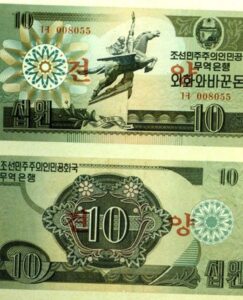North Korea has recently issued new foreign currency vouchers, but has yet to make full-fledged efforts to put them into circulation, Daily NK has learned. It appears the country’s leadership is closely managing the release of the vouchers out of concern of both their economic impact and effectiveness.
Foreign currency vouchers, which can be exchanged for foreign currency, were first issued by North Korea’s Central Bank in 1979. North Koreans were able to use them at foreign currency shops in the 1980s and 1990s.
However, inflation set in as North Korean authorities over-issued the vouchers, and foreign exchange shops found themselves unable to exchange the vouchers for cash at banks.
Circulation of the vouchers fell as their value plummeted. Ultimately, they were abolished with economic reforms implemented on Jul. 1, 2002.
As part of desperate measures to fix the country’s shortage of foreign exchange, North Korea is apparently trying to re-issue the vouchers.

An internet news website focused on North Korea, “The Freedom And Life,” reported on Sept. 7 that North Korean authorities once again issued foreign currency vouchers.
Daily NK recently acquired a photo of an actual voucher issued by the country’s authorities. Printed on the voucher was the issue date, “Juche 110,” or 2021.
Daily NK tried to confirm the issuance of the new vouchers through sources located in various places in the country, but found that very few people are aware of them.
Most ordinary Pyongyang residents, who use dollars to purchase clothes and industrial goods like electronics in markets, were unaware the vouchers had been issued.
In fact, Daily NK understands that only a handful of cadre-level individuals know the vouchers have been issued, or have actually seen them.
If the vouchers had begun circulating among the population, the authorities would have had to provide information about how they could be acquired. Moreover, foreign currency shops would have had to ban the use of dollars. None of these measures have been taken by the authorities, however.
According to a Daily NK source in Pyongyang last Thursday, foreign currency shops in Pyongyang such as the Rakwon Department Store and Kumbyol Store are still accepting dollars.
Moreover, written directives publicizing the issuance of the vouchers and instructing locals how to acquire them are nowhere to be found in downtown Pyongyang, including in foreign exchange shops.
People in South Pyongan Province and even in provinces near the Chinese border such as North Pyongan Province and Yanggang Province were unaware the vouchers had been issued. Daily NK also found that some shops have been accepting dollars and Chinese yuan.

“Even if [the authorities] issue and circulate the vouchers, there won’t be many people using them,” said the source. “All North Koreans believe they should hold on to dollars or yuan, even if the nation falls to ruin.”
That is to say, North Koreans believe foreign currency is more durable than North Korea’s own currency.
In fact, when North Korean authorities over-issued the vouchers in the 1990s, their value plummeted and many businesses and people who had the vouchers were financially ruined or suffered monetary losses.
North Koreans have learned from experience to distrust the vouchers, while their faith in foreign cash has grown.
This being the case, if the authorities were to force people to use the vouchers instead of foreign currency, circulation of foreign currency in markets could fall as locals try to avoid using the vouchers. The North Korean state would then have to induce people to “voluntarily” use the vouchers.
North Korean officials may feel that they need to limit the circulation of the vouchers to prevent a repeat of the “negative side effects” witnessed during the 1990s.
“When they drag out failed policies from the past, it means things are pretty desperate,” another source in North Korea told Daily NK. “Given that they’ve issued the vouchers but are not putting them into [full] circulation, the party seems to be worrying a lot about this, too.”
Please direct any comments or questions about this article to dailynkenglish@uni-media.net.


















